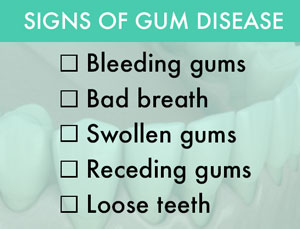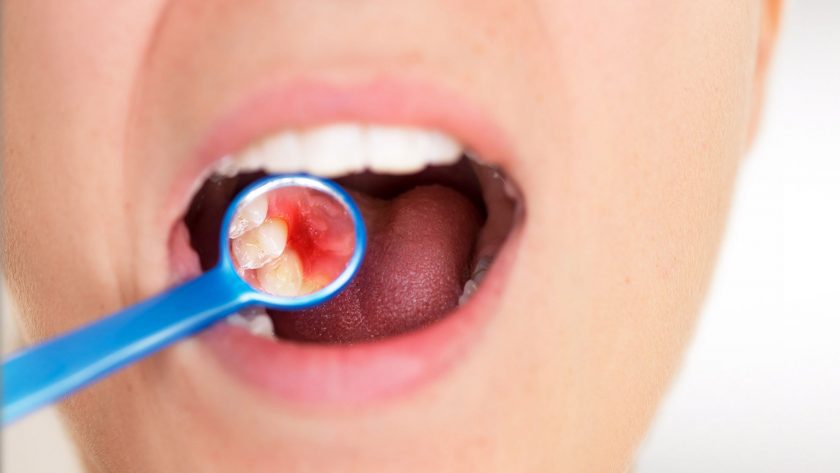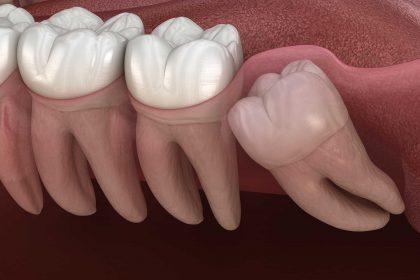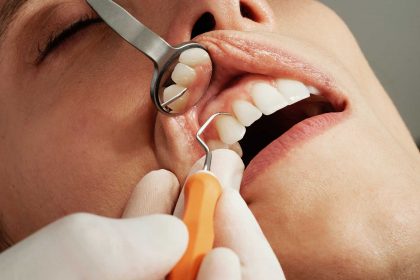While nearly 60% of people have experienced bleeding gums at one time or another, this is not a “normal” condition. If your gums are bleeding — especially if they bleed consistently — you should find out why and take steps to fix the problem.
Your gums might be bleeding because of gingivitis, an inflammatory condition caused by plaque buildup at the gum line. Unchecked gingivitis becomes periodontitis, which damages gums, bones, and teeth. Other causes of bleeding gums include pregnancy, poor diet, improper oral hygiene, certain medications, and diseases such as diabetes and leukemia.
Proper and regular cleaning of the teeth and gums is enough to address many causes of bleeding gums. For persistent bleeding, though, a visit to a dentist is important to address any serious underlying issues.
Causes of Bleeding Gums
Inflammation and gum disease — aka gingivitis and periodontitis, respectively — are leading causes of bleeding gums. Proper oral hygiene and regular dental checkups are the best way to prevent these conditions. Other possible causes of bleeding gums are discussed below.
Gingivitis and Periodontitis
Gingivitis is inflammation of the gums. It begins with the buildup of plaque near the gum line on teeth. Symptoms include swelling, irritation, and redness of the gums, and sometimes bleeding. Gingivitis is very common, but it should be treated immediately. A visit to your dentist, along with renewed attention to your daily oral hygiene habits, can reverse gingivitis before it becomes something more serious — like periodontitis.

Periodontitis is gum disease, but it affects more than just the gums. This severe gum infection can also cause major, irreversible damage to bones and teeth. Teeth can come loose and fall out, and periodontitis is even a risk factor for heart and lung disease. Advanced periodontitis can require surgery, which is an unfortunate and expensive consequence for not brushing your teeth and seeing your dentist.
Pregnancy Gingivitis
Sometimes gingivitis isn’t your fault. Sometimes you can blame it on the baby. Pregnancy can cause hormonal changes that make plaque buildup and subsequent gum inflammation more likely. Extra care brushing your teeth is therefore important when you’re expecting. Schedule a visit with your dentist or hygienist even if your gums aren’t bleeding, and do let them know about your condition.
Menstruation
It doesn’t seem fair, but just as with pregnancy, hormonal changes brought on by menstruation can result in bleeding gums — and maybe swollen salivary glands and canker sores, too. Menstruation gingivitis can begin as early as a day or two before the period starts.
Improper Oral Care
Sometimes your gums might bleed because you’re taking care of your teeth — you’re just not doing it quite right. Teeth should be brushed at least twice a day and flossed once a day. But brushing too hard or using a toothbrush with hard, stiff bristles can damage the gums. You only need gentle pressure with your toothbrush to remove plaque, and dentists recommend selecting a brush with soft bristles.
When it comes to flossing, that’s one of the best things you can do for your teeth and gums. But floss can cause your gums to bleed if they’re not used to it. Irregular flossing doesn’t give your gums a chance to adapt, and so they might bleed every time you try. So make a habit of flossing every day. If you floss every day and your gums continue to bleed, see your dentist for a checkup, treatment, and oral hygiene advice.
Poor Nutrition
Poor nutrition can lead to bleeding gums in a couple of ways. Most obviously, sugary foods feed the bacteria that live in plaque and lead to gingivitis, inflammation, and infection. Another possibility, though, is a vitamin deficiency. If you’re not getting enough vitamin C, you could be on the way to that old sailor’s disease, scurvy (aaargh!), with its associated bleeding gums and tooth loss. Fortunately scurvy isn’t common today. But it can still pop up in association with eating disorders, severely restricted diets, or poverty. Other concerns are vitamin K, which is necessary for proper blood clotting; vitamins A and E for their antioxidant properties; and vitamin D and calcium for strong bones and teeth. If you suspect you’re at risk for vitamin deficiencies, consider consulting with your doctor or a certified nutritionist.
Medications
Several classes of medications can lead to bleeding gums. These include blood thinners, antidepressants, and blood pressure medications. It’s important when you visit your dentist to let them know which medications you’re taking, as these can affect treatment options and signs and symptoms that the dentist needs to watch out for.
Smoking or Vaping
Smoking or vaping puts you at higher risk of gum disease and cancers (including oral cancer). Ironically, though, since smoking inhibits blood flow to the gums, bleeding gums might be less evident, making gum disease a bit harder to detect. Has anyone ever told you to quit smoking? You should listen to them. Don’t be surprised, though, if your gums start to bleed more when you quit. Quit smoking and see a dentist for a treatment plan to get your mouth in tip-top.
Incorrect Denture Fit
If you wear dentures that don’t fit properly, they could be aggravating your gums. See your dentist for an adjustment or replacement.
Underlying Health Conditions
If you’ve been through the entire list above and still don’t know why your gums are bleeding, there’s always the possibility of an underlying health condition. These can be quite serious, so a visit to your doctor to discuss your symptoms is warranted. The list of possibilities includes liver disease, blood clotting disorders, leukemia, anemia, diabetes, and hemophilia.
Treatment for Bleeding Gums
Treatment for bleeding gums should always address the cause: improve your diet, fix your dentures, etc. In most cases, though, the cause is improper oral hygiene. The treatment will be to improve your oral health habits. That means regular visits to your dentist, with professional cleanings as often as your dentist recommends.
As for cleaning your teeth at home, consider the following:
- Brush your teeth at least twice a day, for two minutes each time, once before breakfast and again before bed. Studies have shown that manual toothbrushes work as well as electric toothbrushes for cleaning plaque, but I personally find electric toothbrushes much easier to use. With an electric toothbrush you’re less likely to press too hard, and some models include built-in timers to make sure you brush for the full two minutes.
- Floss at least once a day.
- I love using an oral irrigator (aka water flosser). It gives the gums a nice massage and it’s amazing how much crud it flushes out of the mouth even after brushing and flossing.
- Some studies have shown mouthwash to be effective at long-term plaque control, but not all dentists recommend it. Ask your dentist for advice. Avoid alcohol-based mouthwash, which can dry out your mouth. Any mouthwash should be spat rather than swallowed, especially mouthwash that contains fluoride.
Monitor your gums closely
Bleeding gums are most often a sign of poor oral health, but sometimes we don’t even notice that our gums are bleeding. It’s not always a horror show in your mouth; it’s not as if your gums suddenly turned into that hallway from The Shining. If you’re not looking closely, maybe the most you’ll notice is an occasional coppery taste. So be sure to check for swelling or gums that are redder than usual, which are also signs of the conditions we’ve gone through above. And once again, make those regular, preventive appointments with your dentist!




